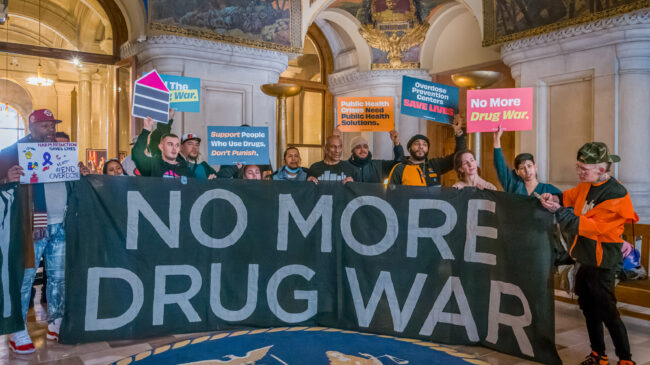The Drug Legalization Handbook is a living document. As new information and data arrive, the words on these pages will change. The intent of this handbook is simply to provide a framework for how to legalize all drugs. Much conversation and work has been done to detail why we should legalize drugs, but not enough effort has been done to show people how we can successfully legalize drugs in the current legal regime.
As the founder of the National Coalition for Drug Legalization, I must admit that my journey to believing in the legalization of all drugs began with loss and tragedy. As late as 2017, I supported drug prohibition. However, when my cousin Duane passed away, his death made me think about issues that affect Black men and the Black community as a whole. Duane was born drug dependent. He later went to prison over drugs and died in his struggle with alcoholism. At his funeral, I met his son Desmond for the first time. I could not believe how much Desmond resembled Duane. He had Duane’s fingers, body shape, and demeanor. There was no denying that he was Duane’s son. Immediately, I made a commitment to ensure that Desmond did not live the life his father led. I made Desmond an offer: He could live with me provided that he graduate from high school, go to college, and work. Desmond kept his end of the deal when he graduated from high school. This was a proud moment for me, considering that his father dropped out of high school in the 12th grade. To see Desmond in college and working part time made me very happy, but I couldn’t help but think why Duane’s story of drug abuse and imprisonment is so common among Black families? Why couldn’t Duane see his son graduate from high school? Why couldn’t Duane move beyond his substance abuse problem?
The answer is drug prohibition.
Our current drug laws negatively and disproportionally affect people of color, especially Black people. The felony record Duane received from his drug sentence prohibited him from finding a decent job, applying for Pell Grants, and accessing most kinds of public assistance.
I then started to think about issues related to poverty and how drug prohibition contributes to crime and drug overdoses in poverty-stricken communities. People will resort to selling drugs when job opportunities for low-skilled, low-wage workers are virtually non-existent. People will abuse drugs under the same circumstances.
Our drug supply is not safe. Prohibition has created very fertile ground for organized crime. There are no standards for purity or potency, hence the increase of fentanyl overdoses due to contamination unbeknownst to drug users. Violence is common in an illicit economy where people cannot resolve their disputes through lawsuits or arbitration.
America needs to recognize that we will not see a reduction in violent crimes until we legalize drugs. All drugs. We need to recognize that we will not see a reduction in opioid overdoses until we legalize opioids like heroin. I ask that all who read this handbook keep an open mind. What is presented is unconventional, but it is clear that the current approach to drug use has failed. Use a critical eye to evaluate the guidance shared in this handbook. I hope to open your heart and inspire you to join our movement to abolish drug prohibition.
I want to thank all of the esteemed contributors to this handbook.
The views and opinions expressed within each section are those of the authors and do not necessarily reflect on the collective. From the outset, I believed it was important to include a range of viewpoints from among the community of drug-policy reform advocates. I’m thrilled that we were able to get so many knowledgeable contributors to impart their wisdom.
In solidarity,
Veronica Wright,
Founder of the National Coalition for Drug Legalization
The prospective legalization of drugs is a sensitive and complicated topic that inevitably evokes visceral reactions from most observers. Legalization proponents believe the drug war has represented a vast overreach of government power and that this power has often been applied in arbitrary and discriminatory ways.
Often, the so-called “War on Drugs” has served as a pretext for authorities to harass communities or individuals they dislike. More broadly, a prohibition on legal commerce simply creates market opportunities for illegal sellers to organize illicit markets. American prohibition of alcohol, for example, led to the emergence of the American Mafia, which sought to fill the still-existent popular demand for liquor. Today, there are clear parallels with international drug cartels.
On the other hand, defenders of the status quo believe federal, state, and local governments safeguard the public welfare by enforcing drug prohibition. They believe drugs are a threat to national health and rightly view addiction as leading to a pattern of destructive behavior.
Parents often worry about how the availability of drugs will affect their children. No parent wants to see their child succumb to addiction. All of these concerns are valid. However, the contributors to this volume recognize that the use and abuse of drugs have not disappeared even after decades of strict legal prohibition. To the contrary, deaths associated with drug use have reached all-time highs in recent years. Drugs adulterated with harmful substances like fentanyl have proliferated rapidly in an illicit market where there are no manufacturing standards, clear labeling requirements, or product liability insurance. Likewise, violence throughout Latin America and along the border states has grown steadily for decades as international drug cartels have amassed power and wealth.
In the face of these dangers, it may be time to admit that a legal and regulated market for drugs is likely to produce less dangerous outcomes for both society at large and the individuals who choose to consume drugs. Orderly transactions for clearly labeled products with controlled access or medical supervision can cut through the violence associated with illicit markets and also minimize accidental overdose. The contributors to this volume hope to launch a renewed national conversation about whether the drug war actually protects the American public from harm. If not, we as a society should begin to consider an alternative approach based on reason and evidence.
The approaches considered here are intended to inform that debate.
Geoffrey Lawrence,
Research Director, Reason Foundation
Part 1 The History of the War on Drugs
Part 3 Taking Drugs Off the Schedule: Eliminating the Controlled Substances Act
Part 4 Sensible Retail Markets
- 4.1 Majority of Overdose Deaths Are Due to Adulterants
- 4.2 A Regulated Market
- 4.3 Consumption Limits and Restrictions
Part 5 Therapy for Drug Dependence
Part 6 Role of Law Enforcement and Policing
Part 7 Protections from Civil and Criminal Liability
Part 8 Packaging, Labeling and Dosage of Drugs and Drug Products
Part 10 Education and Research
Part 11 Establishment of A Regulatory Board
Part 12 Taxation of Drugs and Drug Products
Part 13 Testing of Drugs and Drug Products
Part 14 Restorative Justice: Social Responsibility and Community Reinvestment
Part 16 Medical Administration
Full Document: Drug Legalization Handbook



